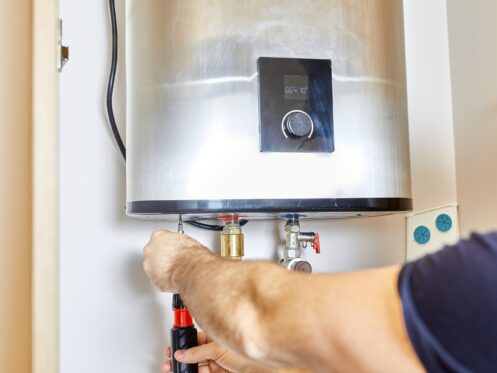When it’s time to shower, wash clothes, or wash dishes, a water heater is a very useful device in your home. These appliances come in two distinct varieties, with arguments for each. Each type, whether a tank or tankless water heater, will heat your water evenly and well, but which will be best for your home? We will take a look at each type so that you can understand how each works and make an informed decision about which would best serve your needs.
Tank Water Heaters
These water heaters, also known as storage, traditional, or conventional water heaters, use a storage tank to store water. Their capacities vary, but they typically range from around 30 gallons for one to two people to more than 80 gallons for a household of more than five. Generally, if you use a lot of hot water, you’ll want to consider a larger tank.
Functionally, these take in water at the dip tube at the tank’s base. The water then flows upward through the tank, eventually being distributed at the top. A thermostat attached to the unit regulates the water temperature, allowing you to set a preferred temperature. The pump at the top of the storage heater distributes water to various areas of your home so that you can use it as needed.
Benefits of Tank Water Heaters
As the oldest type of water heater available, tank water heaters are inexpensive to purchase, install, and maintain. These are also relatively simple to run and don’t require much circuitry to ensure the right levels of warm water. Since many of these are gas-heated, they hook up very easily to existing gas lines with little need to upgrade or alter current connections.
Storage tank water heaters provide immediate hot water. When it flows into the section of the house where it’s needed, the water is already heated to the preset level because of the temperature-regulated tank. This means that the heater is always ready for water demands as long as there’s enough water in the tank.
Disadvantages of Tank Water Heaters
Despite being cheap and easy to install, tank water heaters have some noteworthy problems. First, once you’ve depleted the tank, it will require refilling with hot water, which takes some time. If you run multiple appliances that use hot water simultaneously, you’ll run out, especially if you have a lower-capacity tank. You can circumvent this by employing multiple storage tank water heaters.
Secondly, these take up a lot of space. When you’re using something that stores anywhere between 30 and 80 gallons of water at a time, you’re going to take up some physical real estate. As a general rule, these tanks are in kitchens or laundry rooms, so you’ll need to establish a space to store this kind of water heater.
Finally, while tank water heaters are cheap to purchase and install, there’s a hidden cost that some don’t consider: utility bills. Tank water heaters use either gas or electricity to heat the water in the tank, and as a result, your monthly gas or electric bill will be higher. This will increase if you or your family consistently use the hot water stored in the tank.
Fortunately, there are ENERGY STAR-rated models on the market that use better insulation to reduce heating requirements, but you should still expect to spend more than a tankless heater on a per-month basis.
Tankless Water Heaters
With a tankless water heater, the device uses a heat exchanger to heat the water at an accelerated rate. As a result, there’s an immediate space-saving value since you don’t need to store the water for heating. Water enters the heater and flows over the heat exchanger, which transfers the thermal energy to the water. Similar to a tank water heater, you use a thermostat to set the preferred water temperature. Most tankless heaters allow homeowners to heat water up to about 140 degrees Fahrenheit.
These water heaters, which are also sometimes referred to as on-demand water heaters, can be gas- or electric-heated, so homeowners with different connections have options. Since they use circuitry to maintain water temperature, they are a bit more complex than traditional water heaters.
Benefits of Tankless Water Heaters
There are numerous advantages to a tankless water heater. First, without a sizeable water tank, tankless heaters are much better for homes with limited space. These are also far more efficient than tank water heaters. Rather than consistently heating water in a large volume using gas or electric power, tankless heaters warm the water on-demand, which means that there’s no required continuous energy use. When there’s a need for heating, the system provides it, which saves about $44 per year for a household, according to the U.S. Department of Energy.
Tankless water heaters are more complex than conventional units, but this doesn’t mean that they need more maintenance and upkeep. As a general rule, tankless units last at least five years longer than storage tank units, which tend to last between eight and 12 years on average.
Disadvantages of Tankless Water Heaters
Despite the large number of advantages, there are some noteworthy cons as well. With these kinds of water heaters, the delivery of hot water isn’t quite as timely as it is with a tank heater. This is because the water has to travel over a heat exchanger to pick up heat. Effectively, it can take anywhere between five and 10 seconds for hot water to reach the faucet.
Also, the initial cost of a tankless water heater is more expensive than that of conventional water heaters. This is because the technology within one of these units is much more complex and employs circuitry and heat exchangers to quickly heat water and maintain the appropriate temperature.
The installation process is also much more complex, especially in households set up for storage water heaters. Also, since these require a higher flow rate in the plumbing itself, using one may necessitate plumbing upgrades to accommodate the tankless heater. Fortunately, despite the up-front costs of one of these units, the money spent is often recouped thanks to utility bill savings.
Which Is Better?
When you’re in the market for a new water heater, there’s no real one-size-fits-all solution. Both of these water heater styles have advantages. If you need hot water without pause and have a meager budget, consider a traditional tank heater. These have hot water available immediately and cost very little to install and purchase. On the other hand, if you need steady hot water with a heater that has a minimalist physical profile, then a tankless heater may be best. These also stand out because of the energy cost reduction they deliver.
At Marr's Heating and Air Conditioning, we’ve been installing all types of water heaters in the Bellingham area since 1965. We are a family-owned business that also provides electrical, heating and cooling, and other plumbing services. We can help you decide which water heater is best or assist you with other HVAC needs for your household, so give us a call today for a consultation!

